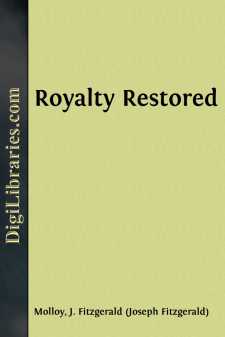Categories
- Antiques & Collectibles 13
- Architecture 36
- Art 48
- Bibles 22
- Biography & Autobiography 813
- Body, Mind & Spirit 142
- Business & Economics 28
- Children's Books 15
- Children's Fiction 12
- Computers 4
- Cooking 94
- Crafts & Hobbies 4
- Drama 346
- Education 46
- Family & Relationships 57
- Fiction 11828
- Games 19
- Gardening 17
- Health & Fitness 34
- History 1377
- House & Home 1
- Humor 147
- Juvenile Fiction 1873
- Juvenile Nonfiction 202
- Language Arts & Disciplines 88
- Law 16
- Literary Collections 686
- Literary Criticism 179
- Mathematics 13
- Medical 41
- Music 40
- Nature 179
- Non-Classifiable 1768
- Performing Arts 7
- Periodicals 1453
- Philosophy 64
- Photography 2
- Poetry 896
- Political Science 203
- Psychology 42
- Reference 154
- Religion 513
- Science 126
- Self-Help 84
- Social Science 81
- Sports & Recreation 34
- Study Aids 3
- Technology & Engineering 59
- Transportation 23
- Travel 463
- True Crime 29
Royalty Restored
Description:
Excerpt
CHAPTER I.
Cromwell is sick unto death.—Fears and suspicions.—Killing no
Murder.—A memorable storm.—The end of all.—Richard Cromwell
made Protector.—He refuses to shed blood.—Disturbance and
dissatisfaction.—Downfall of Richard.—Charles Stuart proclaimed
king.—Rejoicement of the nation.—The king comes into his own.—Entry
into London.—Public joy and satisfaction.
On the 30th of January, 1649, Charles I. was beheaded. In the last days of August in the year of grace 1658, Oliver Cromwell lay sick unto death at the Palace of Whitehall. On the 27th day of June in the previous year, he had, in the Presence of the Judges of the land, the Lord Mayor and Aldermen of the City, and Members of Parliament assembled at Westminster Hall, seated himself on the coronation chair of the Stuarts, assumed the title of Lord Protector, donned a robe of violet velvet, girt his loins with a sword of state, and grasped the sceptre, symbolic of kingly power. From that hour distrust beset his days, his nights were fraught with fear. All his keen and subtle foresight, his strong and restless energies, had since then been exerted in suppressing plots against his power, and detecting schemes against his life, concocted by the Republicans whose liberty he had betrayed, and by the Royalists whose king he had beheaded.
Soon after he had assumed the title of Lord High Protector, a most daring pamphlet, openly advocating his assassination, was circulated in vast numbers throughout the kingdom. It was entitled "Killing no Murder," and was dedicated in language outrageously bold to His Highness Oliver Cromwell. "To your Highness justly belongs the honour of dying for the people," it stated, "and it cannot but be an unspeakable consolation to you, in the last moments of your life, to consider with how much benefit to the world you are likely to leave it. It is then only, my lord, the titles you now usurp will be truly yours; you will then be, indeed, the deliverer of your country, and free it from a bondage little inferior to that from which Moses delivered his, you will then be that true reformer which you would now be thought; religion shall then be restored, liberty asserted, and Parliaments have those privileges they have sought for. All this we hope from your Highness's happy expiration. To hasten this great good is the chief end of my writing this paper; and if it have the effects I hope it will, your Highness will quickly be out of the reach of men's malice, and your enemies will only be able to wound you in your memory, which strokes you will not feel."
The possession of life becomes dearest when its forfeiture is threatened, and therefore Cromwell took all possible means to guard against treachery—the only foe he feared, and feared exceedingly. "His sleeps were disturbed with the apprehensions of those dangers the day presented unto him in the approaches of any strange face, whose motion he would most fixedly attend," writes James Heath, gentleman, in his "Chronicles," published in 1675....


